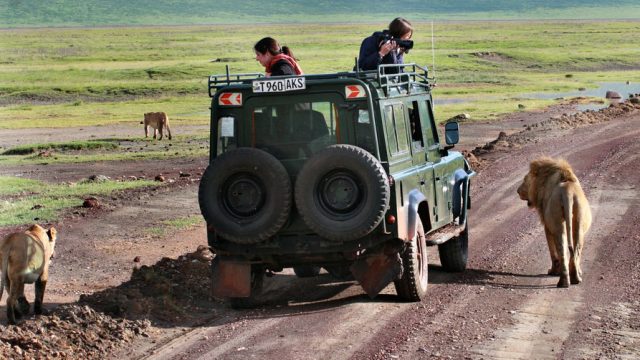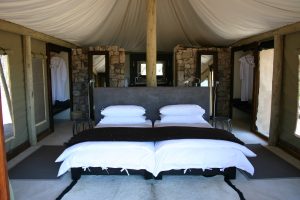A quick glance at African safari options reveals a vast range of price points for seemingly similar products. While of course this could be said about the hotel industry in general, it is perhaps easier to see why a hotel overlooking Manhattan’s Central Park costs more than a motel in small-town Tennessee. However, when properties all seem to fall on the fringes of national parks – and guests all spend their time traversing the same terrain – the value of $100 per night versus $1100 per night can befuddle the first-time (or third-time) safari-goer. How much a safari should cost depends on multiple overlapping factors, which we help unravel here — the intention of this article is to help decipher the differences in hopes of finding the best value-for-service match for you.
First, the basics
Before I dive into the specifics, here is where I define my relative price points:
- Budget: under US$200 per room per night
- Midrange: US$200-500 r/n
- Luxury: US$500-1300 r/n
- Ultra-Luxury: + US$1300 r/n
The assumption is that these price points include all meals and game drives. Gratuities are not included, nor are transfers to and from the property. Alcoholic beverages are generally excluded at budget and mid-range lodges, while luxury and ultra-luxury tend to be completely inclusive.
The age old question: ‘Is the wildlife actually different at the varying price points?’
Before I answer this question, I first need to clarify the difference between national parks and private game reserves (PGRs). National parks are fairly self-explanatory and universal. Anyone – lodge clients or independent adventurers – can access them. All that is required is that you arrive with transport, and that you (or your lodge) pay the daily entrance fee. Routes are clearly marked out and all guests are permitted to traverse all the tracks during particular hours.
PGRs by contrast, are a bit more rule-ish. These tracts of land are privately owned, and lodges operating within them buy particular rights for operation and traversing. Often, they are located on the fringes of National Parks (Sabi Sands PGR on the edge of Kruger NP, for example). Roads exist, but guides are also permitted to drive off-road. Finally, they are not open to the general public, meaning traffic is hugely limited and exclusivity is, as a result, much higher.
Generally speaking, budget and mid-range lodges will be located just beyond national parks, and they bring in guest daily. Luxury and ultra-luxury lodges will occasionally operate on the same basis – though more are located directly inside a PGR. Some lodges, from all categories, are also located inside the boundaries of national parks.
Now, returning to the question of wildlife. The simple answer is no – the lions are not better at more expensive lodges. What is “better” for many people is the viewing experience. In PGRs, you avoid the throngs of vehicles that surround a coveted sighting. With lower traffic, the ability to drive off-road, and a series of regulations that limit vehicles permitted at a sighting, exclusivity and intimacy is often considered to be higher here. That said, national parks remain fantastic all the while. Wildlife is sensational and, with some time and expertise, you are still able to experience a number of unique and exclusive sightings on a safari.
And onto vehicles: Does money really buy a better seat?
The answer to this is a resounding yes. At a higher price point, you will find yourself sitting in one of the world’s more luxurious open-air land rovers/rangers – think cushioned seats, silent vehicles and in-truck power outlets. Less expensive packages will seat clients in open-air vehicles or converted minivans with pop-up roofs.
Virtually all price points will, however, have you ride with other lodge clients, though your vehicle may be fuller at a lower price point. But there is almost always the option to pay a private-vehicle supplement, should you wish to explore with only your party.
And what about the guides – are they different?
Most African countries follow either a regional or national guiding certification program – and they all come with tiers. Every credible outfitter will hire a certified guide who is guaranteed to have a thorough fundamental knowledge of the bush. More elite lodges will however hire some with greater qualifications, meaning they can offer services like walking safaris and specialized species knowledge. That said, charisma and likability can be found through all levels, at absolutely all price points.
The one thing that is different with the ultra-luxury (and some luxury) lodges is that they provide a tracker in addition to a guide. This person sits perched on the front of a vehicle, and is specifically trained to look for signs of wildlife, while the guide focuses more on your well-being, your experience and radio contact with other vehicles. The two work together to navigate the bush and provide, in theory, better sightings for their guests.
And accommodation and food?
Extravagance runs in close parallel to price when it comes to African safaris. For those who shell out over US$1500 per night, opulence and indulgence are the name of the game. By this I mean private plunge pools, elegant cottages, warmed beds in the evening, sherry and champagne around every corner, and truly sensational bed sheets. Meals too are an absolute event – think six-course tasting menus with multiple wine pairings from a cellar in the bush.
For a lesser price, you can certainly expect less extravagance – and for many, that suits them perfectly. Returning to fundamentals as you camp in a canvas tent with an outdoor shower is far more natural. Simple star and candle-lit meals paired with evenings around a fire ensure that the wilderness remains the focal point of your experience.
How about the freedom to design your own day?
Whether you are on a budget or an ultra-luxury safari, the daily structure is roughly the same. Game drives occur either in the early morning and evening, or last for the entire day. Guests are always provided with the choice to attend or not attend each day. If you don’t attend, there are often some activities around the camp – though you are generally left to your own devices.
Okay – what about self-guided and self-catering options?
For those among us who really value freedom and independence – and perhaps already have a preliminary sense of the bush – this may prove to be your best option. Renting a small cottage on the fringe – or even inside – of a park allows you to design your perfect African experience, in a cost-efficient way.
The primary concerns are that first, without the knowledge of the particular region (and the radio signal with other rangers), your wildlife sightings may be somewhat more limited. Secondly, organizing self-guided safaris does tend to be a lot more work – particularly if you are not overly experienced in the bush. They also may not necessarily work out to be cheaper than a budget option in the long run (but they may be more comfortable and more private). All that however is contrasted with the sheer exhilaration of navigating the wilderness on your own time – and, with your own senses.
With that, I encourage you to set out into the bush and experience the magic and wonder of an African safari!



